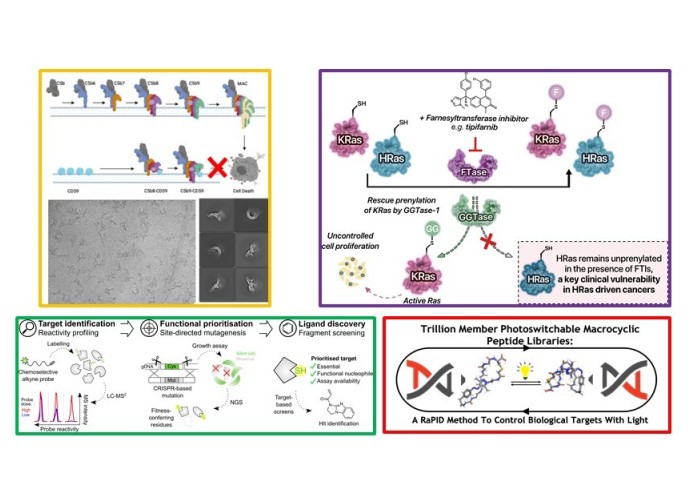PG symposium 2021 winners

Congratulations to PhD students Henry Benns, Emma Couves, Sarah Hassan, and Thomas Jackson on winning prizes for their talks and posters!
This year’s virtual postgraduate symposium showcased talks and posters spanning a wide range of research topics. For talks in the 'chemical biology & healthcare' section, first and second place prizes were awarded to Emma Couves and Henry Benns, respectively.
Of the 60 research poster presentaions, 12 people were awarded prizes. One of the first place prizes was awarded to Sarah Hassan and Thomas Jackson won second place.
Below are short summaries of the projects undertaken by Emma, Henry, Sarah, and Thomas.
Emma Couves
Emma's research focuses on The Membrane Attack Complex (MAC) which is an innate immune responder able to kill many types of cells. Host cells are liable to damage from MAC and express a cell surface inhibitor protein CD59, to protect themselves from MAC attack via an unknown mechanism. Emma presented her findings on CD59's ability to inhibit MAC and more recent developments have revealed the molecular mechanism by which CD59 protects cellular damage during an immune response.
This project was funded by Cancer Research UK, EPSRC ICB-CDT, and European Research Council grant.
Henry Benns
Henry's research focuses on the development of a new technological platform, combining chemoproteomic reactivity profiling and CRISPR-based functional genomics, for prioritising targets for covalent drug discovery. The work was conducted in collaboration with the Weerapana Group (Boston College) and is funded by the BBSRC DTP.
Sarah Hassan
Farnesylation and geranylgeranylation are two classes of protein prenylation, a type of irreversible lipidation that modulates localization and signalling events. Sarah aims to deconvolute the regulators of prenylation switching dynamics, an understudied phenomenon almost exclusive to a subset of oncogenes whereby proteins can compensate for a lack of farnesylation by switching to geranylgeranylation, evading therapeutic intervention. Understanding prenylation switching may help in the identification of novel druggable vulnerabilities in cancers.
Sarah is funded by the Imperial President's Scholarship scheme.
Thomas Jackson
Light is a powerful chemical biology tool to enable non-invasive, yet dynamic control over complex biological systems. Thomas's project aims to integrate molecular photoswitches with a powerful mRNA-based discovery platform, to RaPIDly control biological targets with light-dependant macrocyclic peptides.
This project is in collaboration with Prof. Matthew Fuchter and Dr Louise Walport. Thomas's research is funded by the EPSRC and the ICB CDT.
Well done to everyone involved! Thank you also to our funders and collaborators.
Article text (excluding photos or graphics) © Imperial College London.
Photos and graphics subject to third party copyright used with permission or © Imperial College London.
Reporter
Dr Ravi Singh
Department of Chemistry